Ebook piracy – How to stop your books from being stolen

Risks of selling ebooks online & how to protect them from piracy
Ebooks are an excellent, low-cost distribution method marred by widespread piracy. With the right anti-piracy protection, however, you can protect your ebooks from sharing and your revenue.
 Ebook piracy
Ebook piracy

The question of ebook piracy has been prevalent since their inception. While physical books allow you to hide behind the cost and effort required to create a high-quality copy, this doesn’t hold true in digital form. Sharing the file online allows anybody who wants your ebook to download a version indistinguishable from the original.
As a result, though it doesn’t hit the headlines nearly as often, ebook piracy is an enormous problem. It cuts into publishers’ revenue and the royalties of hard-working authors when selling ebooks online.
If you want to stop ebook piracy, you need to:
- Be aware of the threats it poses
- Understand what ebooks people pirate and why
- Learn how pirate ebooks are distributed and shared
- Understand where copyright and the DMCA can help you and when they can’t
- Realize when watermarks are useful and when they aren’t
- Avoid ineffective ebook DRM solutions
- Avoid flip books and other solutions that provide weak security
- Use a PDF DRM solution to protect your books
We’ll get into each of these topics in more detail below.
 Selling ebooks online: the ebook piracy threat
Selling ebooks online: the ebook piracy threat
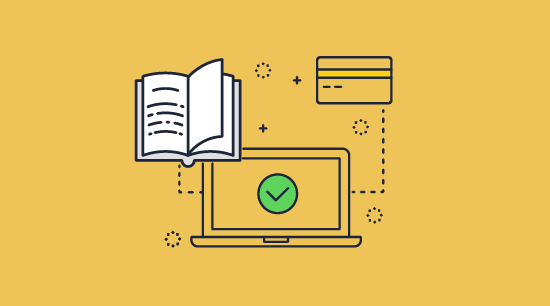
Ebook piracy sites and sharing of pirated books are on the rise, which is a problem for self-publishers who need to earn a living. Publishing and selling ebooks online is therefore a big concern, but just how bad is it?
 How common is ebook piracy?
How common is ebook piracy?

According to statistics from the UK’s Intellectual Property Office, in 2022, 24% of ebooks consumed online were done so illegally. It may surprise you to hear that the percentage of ebooks pirated was on par with film, and higher than TV (19%) and video games (17%). Digital magazines, meanwhile, had a staggering piracy rate of 44%.
Statistics from the EU IPO are even more damning. Its 2022 study found that publications were the second most pirated type of content in the EU, accounting for 28% of infringement. It doesn’t appear to be getting better, either, with MUSO reporting that between 2021 and 2022, publishing piracy grew by 58.5%, the highest of any piracy category.
 What is the impact of ebook piracy?
What is the impact of ebook piracy?

Neilsen estimates that ebook pirates take away around 33% of the US ebook market, costing it $315 million. For authors, this represents an existential threat. Best-selling novelists have recounted stories of their publishers having to cut sequel print runs in half after sales drops correlating strongly with the proliferation of illegal copies. But there are also other, less direct impacts:
- Reduced investment in future content
Author and publisher profits don’t just give them a bigger payday. They allow them to invest money back into the business to develop ambitious new content, hire great talent, create merch and additional products, hold events, and more. They might not even feel like writing another book. - Higher prices for everyone
Publishers and authors must somehow compensate for revenue lost to piracy. One way of doing so is by raising costs for regular consumers, leading to inflation in ebook pricing. - Potential for misrepresentation
Pirate copies of ebooks may not be as high quality as the original, with conversion sometimes negatively affecting text formatting or image compression. This can reflect poorly on the publisher if the consumer believes they are buying a legitimate copy or the copy reflects the real product. Additionally, there’s the potential for text in the ebook to be deliberately changed or for links to malicious sites or software to be added. - Impact on libraries
The unfortunate truth is that many will not drag themselves to a library when they know they can also get their book for free online in seconds. Some libraries are starting to adjust to this with their own ebook catalog (see when did libraries start lending ebooks), but this requires more investment and strict controls over lending due to licensing constraints. It’s impossible for them to offer a catalog that is as varied or available as a piracy site. - Struggles for physical bookstores
Physical bookstores have struggled for a while, notably smaller, indie ones. Ebook piracy may prevent people from going to physical bookstores and making purchases. They know that instead of paying $10+ for a physical book, they can download it for free. - Inaccurate market data
Publishers, ebook platforms, and industry analysts cannot track sales of pirated ebooks in the same way they can legitimate ones. This makes it more difficult to determine what readers want, how to market to them, what pricing to use, and ultimately, how much profit the industry makes. It also makes it harder to determine the health of the digital publishing industry and how preferences change over time.
While the average pirate may not consider all of these factors, they at least understand that they are robbing the author of a sale. So, why do they do it?
 Can’t pay, or won’t pay?
Can’t pay, or won’t pay?

The argument often presented to downplay piracy is that users would not have been able to afford the goods otherwise. However, with libraries already providing books for free, and most having an extensive online catalog, this doesn’t ring true for ebooks. One study suggests that the most prevalent demographic of ebook pirates is those aged 30-44 in higher socio-economic brackets. The study found that just 13% of ebook pirates earn under $30k a year.
When it comes to ebook piracy, then, the motivation is less “can’t pay”, and more “don’t want to pay”. 51% of the respondents said their main motivator was simply that they were free, and 17% said that they didn’t think they should have to pay.
 What are the most pirated books?
What are the most pirated books?

There aren’t many studies on the most pirated books, but a 2017 Statista report found that the most popular genre of illegal ebook downloads in the US are:
- Fiction: 58%
- Professional: 47%
- Academic texts: 36%
- Non-fiction: 34%
- Children’s books: 33%
- Academic journal articles: 32%
- Christian books: 25%
- Other: 23%
Recent reports suggest that manga is easily the most pirated type of publication, with 69.7% of publishing pirates drawn to manga sites.
 How are pirated ebooks distributed and shared?
How are pirated ebooks distributed and shared?

Pirated ebooks can be found, sold, or downloaded for free through various popular online platforms.
- Asian shopping platforms such as Lazada and Shopee are hotspots for unauthorized vendors to create listings and host pirated ebooks using online file storage services like Google Drive.
- There are many online forums, free download sites, torrent sites, and message boards where pirates share links and instructions on downloading pirated ebooks. Reddit is a prime example where users can find pirated books online.
- Various Russian social media sites distribute pirated books and users can even request ebooks they want to read.
- Legitimate sites like Amazon may unknowingly host pirated books that have been uploaded by someone who is not the copyright holder. This is more common than you may think.
- Reputable organizations like Internet Archive, a nonprofit organization that provides free digital copies of books, have faced lawsuits for alleged copyright infringement due to their lending services.
Pirated books are usually available for free. On some book piracy websites, for a small sum, access is given to collections of pirated ePubs or PDF books.
The problem is that ebooks (like any other digital content) are simple to copy and distribute at minimal cost. Once a publisher creates an ebook and sells it online, piracy is a big risk. Even where ebooks are protected with DRM, failings with the copy protection measures of major ebook software or solutions enable simple restriction removal.
The result is that it is very easy for consumers to pirate ebooks these days. A simple Google search will return piracy sites where books can be directly downloaded and transferred to an e-reader application or device. In some ways, it’s easier to pirate ebooks than to buy them, where users have to create an account, enter their credit card details, etc.
 Does copyright prevent ebook piracy?
Does copyright prevent ebook piracy?

Naturally, piracy is only piracy if you have rights to the distributed content. The good news is that in most countries, including the United States, copyright applies automatically from the moment a work is created. An author has the sole right to reproduce or distribute a book unless otherwise agreed with a publisher or other party.
However, while copyright is granted automatically, there’s a lot to be said for registering your copyright with an official body. In the states, that’s the U.S. Copyright Office. This process is usually simple and inexpensive but allows you acknowledge and therefore enforce your ownership rights. Registering copyright will enable you to definitively say “I created this work at this time” and therefore offers further legal rights and a clear timeline of events should your work ever be challenged.

You should also include a copyright page in your ebook that clearly states the publication date, the creator, the phrase “All rights reserved”, and other important information. This asserts your rights to readers, potentially acting as a deterrent but also making it clear that they can’t claim to be ignorant of your rights. We cover this in more detail in ebook copyright.
 What to do if your book is pirated
What to do if your book is pirated

If you have copyright over an ebook, and notice it on piracy sites, there are really only two things you can do.
-
Pursue legal action
You or your publisher can open a lawsuit against the copyright infringer. Be aware, however, that this can be both time-consuming and expensive. First you have to find the infringer in the first place. If you do, then the average copyright infringement lawsuit costs $300,000 and takes over a year. At the end of all this, there is no solid guarantee you’ll get your compensation since the infringer might not have the funds to do so.
-
Issue a DMCA takedown notice
The other option is to issue DMCA takedown notices to websites hosting the ebook illegally, demanding that it be removed. Unfortunately, however, DMCA (Digital Millennium Copyright Act) notices alone are far from enough to curb piracy. A lot of pirate sites simply ignore these notices and host their sites in places where legal action is ineffective. Eventually, you may be able to get Google and ISPs to delist the websites that host your ebooks, but the reality of the internet is that it takes just minutes to spin up a new one. DMCA notices also do little to prevent users from sharing their ebooks with friends, where 45% of ebook pirates say they received their copy.
So, on its own, ebook copyright is not an effective anti-piracy measure. The best course of action may be to analyze how to prevent this from happening in the first place.
 Social DRM – does it prevent ebook piracy?
Social DRM – does it prevent ebook piracy?

Social DRM or watermarking gives publishers a semblance of protection while allowing users to read their ebooks on any device. It embeds the buyers’ personal details into the ebook itself, both visibly and invisibly, identifying the original owner of a copy.
However, despite its labeling as “DRM”, social watermarking is anything but. It does not restrict what users can do with ebooks – they are free to share them with friends and modify them as they wish. Users can just edit out the visible watermarks using free software like Sigil, which lets you quickly find and replace ebook xHTML files to delete all identifiers. That’s exactly what a team of researchers did with BooXtream social DRM watermarking. Invisible watermarks can also be negated – through a combination of editing file names, the ebook’s CSS, and image metadata.

Ultimately, Social DRM conveniently ignores the fact that many ebook pirates receive their books from friends and family. Naturally, these users do not care about whether they can be identified; they are transparently sharing it with a trusted party – provided they did not download it from a piracy site in the first place.
When it comes to piracy sites, the effectiveness of Social DRM hinges on whether its methods of hiding digital identifiers remain undiscovered. It’s security through obscurity – and this obscurity has already been exposed, leaving it severely weakened.
Watermarks can be made effective, however, if you use other anti-piracy measures such as copy protection and editing restrictions. Locklizard, for example, lets you add a watermark with the recipient name and other dynamic variables. This watermark cannot be easily removed (unlike watermarks added in Word, Adobe, etc.) as we prevent editing and copying in our secure Viewer.
 Expiring download links & password-protected folders
Expiring download links & password-protected folders

Another common “solution” to piracy is sharing ebooks via time-limited or password-protected cloud storage links. The idea is that by having the link expire or requiring a password to access a folder, you prevent customers from sharing ebooks with others.
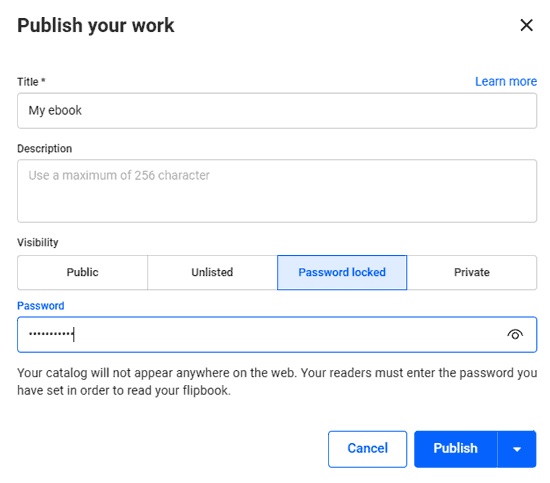
It’s difficult to follow the logic here. All you are really doing is protecting the page the ebook is downloaded from, not the ebook itself. A customer just needs to download their ebook and upload it somewhere else for sharing to bypass this. Additionally, folder passwords can just be shared along with the link, so this has very little impact on its own and only adds inconvenience when used in combination with other methods.
 Why the most popular ebook DRMs fail to prevent piracy
Why the most popular ebook DRMs fail to prevent piracy

A DRM protected ebook uses Digital Rights Management technology to control who can access, copy, and edit digital books. In a bid to better fight piracy, publishers regularly employ DRM solutions to maintain control of authors’ work.
Not all DRM protected ebooks are made equal, however. There are various DRM solutions in the ebook industry, with the major players being Adobe DRM, Amazon Kindle DRM, and Apple FairPlay DRM.
Which of these will be applied to your ebook depends largely on the platform on where you publish it. If you sell your ebook on Amazon, it will naturally make use of Amazon’s Kindle DRM. If it’s from Nook or Kobo, they’ll use Adobe Digital Editions DRM. Google Play Books is based on Adobe’s open platform DRM, while Apple’s iBooks uses its Fairplay DRM.
As you can see, it’s a fragmented and somewhat confusing ecosystem. However, the major thing to take away is that most of these DRM systems aren’t effective. All of the DRM software mentioned above are easily stripped from an ebook, at which point it can be shared and used on any device. A user just needs to download a free online tool like Epubor and press a few buttons.

To make things worse, these tools appear with a simple Google search and aren’t illegal to download – using the loophole that somebody may want to remove DRM from their own book. While these ebooks may prevent some casual infringement, such as sharing legitimate copies with friends, they do not prevent mass online piracy.
 Flipbooks’ anti-piracy measures
Flipbooks’ anti-piracy measures
Another enticing option is distributing your ebook via an online flipbook provider. They take care of servers and hosting and have tools to prevent download, printing, and sharing to boot. You just have to worry about getting the word out.
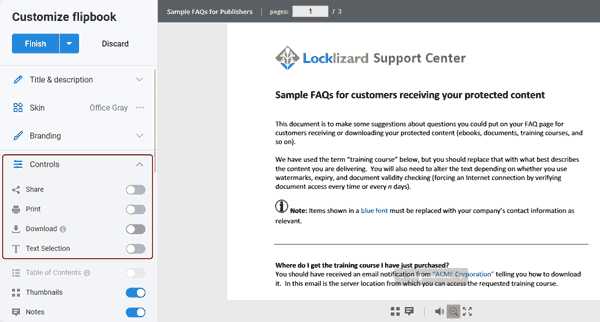
Alas, that’s not quite how it works out in practice. The anti-piracy measures flipbooks offer are weak. They’re enforced in the browser by JavaScript and there isn’t much effort to hide this from the end-user. This is equally true of all solutions that provide viewing of ebooks in a browser. As a result, paying customers change a few letters in the webpage code to re-enable the download button and obtain an unprotected PDF copy to share, print, or edit at will.

Even if a user is not very technical, flipbook access is typically provided via a private link and/or a username and password. It doesn’t take a genius to figure out that you can just share these with your friends to give them access.
 How to stop people from sharing your ebook
How to stop people from sharing your ebook

Due to the failings of mainstream DRM protection and other weak anti-piracy measures, some believe that authors should just give up trying to stop people from sharing their ebooks. In reality, however, comprehensive, effective ebook copy protection is entirely possible if implemented correctly.
Locklizard’s PDF DRM is one such solution. By using a combination of strong encryption, DRM restrictions, a secure viewer application and licensing system, and transparent key management, it leaves few routes for pirates to illegally copy and distribute ebook content, preventing both casual and mass piracy.
 How to stop ebook piracy
How to stop ebook piracy
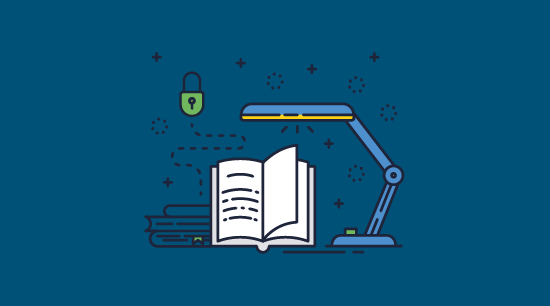
Using Locklizard’s DRM, ebook publishers and authors can protect against the following:
- Unauthorized access and sharing
- Copying and pasting
- Screenshots or screengrabs
- Editing
- Printing
- Printing to a PDF (if printing is allowed)
- Access outside of specific countries and IP addresses
- Access after an expiration date
It does so while being able to maintain partial or full offline functionality with the same level of security, supporting browser viewing, and more.

Here’s how to protect a PDF ebook using Locklizard DRM:
- Right-click the PDF in File Explorer and select “Make secure PDF”.
%22%20transform%3D%22translate(1.2%201.2)%20scale(2.41016)%22%20fill%3D%22%23fff%22%20fill-opacity%3D%22.5%22%3E%3Cellipse%20rx%3D%221%22%20ry%3D%221%22%20transform%3D%22matrix(-.5809%2027.73216%20-106.81608%20-2.23748%20197.3%200)%22%2F%3E%3Cellipse%20rx%3D%2246%22%20ry%3D%2230%22%2F%3E%3Cellipse%20rx%3D%221%22%20ry%3D%221%22%20transform%3D%22matrix(84.31433%2010.80091%20-3.55798%2027.77434%20176%200)%22%2F%3E%3C%2Fg%3E%3C%2Fsvg%3E)
- Move through the PDF Writer tabs and tick the controls you’d like to add.
%22%20transform%3D%22translate(1.3%201.3)%20scale(2.57031)%22%20fill-opacity%3D%22.5%22%3E%3Cellipse%20fill%3D%22%234b8fc5%22%20cx%3D%22103%22%20cy%3D%228%22%20rx%3D%22213%22%20ry%3D%2214%22%2F%3E%3Cellipse%20fill%3D%22%23fff%22%20cx%3D%22101%22%20cy%3D%22131%22%20rx%3D%22180%22%20ry%3D%2292%22%2F%3E%3Cellipse%20fill%3D%22%23d6d3d0%22%20rx%3D%221%22%20ry%3D%221%22%20transform%3D%22matrix(-23.25743%20-43.01462%2024.53354%20-13.26496%2034%2054.5)%22%2F%3E%3C%2Fg%3E%3C%2Fsvg%3E)
A particularly important option for ebook DRM is choosing when to verify document access. You can choose the check the document each time it is opened, only when an internet connection is available, every x days, or never. These options allow publishers to choose the controls that they feel best strike a balance between convenience and protection. You’ll also want to choose whether to:- allow printing
- disable screenshots
- add a permanent and dynamic watermark to viewed and/or printed content
- enforce expiry after a period of use
- Press the “Publish” button at the bottom of the window.
%27%20fill-opacity%3D%27.5%27%3E%3Cellipse%20fill%3D%22%23d1d1d1%22%20fill-opacity%3D%22.5%22%20rx%3D%221%22%20ry%3D%221%22%20transform%3D%22rotate(168.9%20164.5%20104.6)%20scale(494.0625%2062.51262)%22%2F%3E%3Cellipse%20fill%3D%22%23fff%22%20fill-opacity%3D%22.5%22%20rx%3D%221%22%20ry%3D%221%22%20transform%3D%22matrix(393.1765%20-23.13948%204.63058%2078.68087%20199.7%2040)%22%2F%3E%3Cellipse%20fill%3D%22%23d5d5d5%22%20fill-opacity%3D%22.5%22%20rx%3D%221%22%20ry%3D%221%22%20transform%3D%22matrix(-82.79938%20-45.81606%2023.04825%20-41.6531%2025.1%20159.3)%22%2F%3E%3C%2Fg%3E%3C%2Fsvg%3E)
Your ebook will be automatically output to an encrypted .pdc file with editing disabled and access granted to only those with a valid license. - Grant access to valid users. See how to add a new user and grant them document access.
%22%20transform%3D%22translate(1.2%201.2)%20scale(2.41016)%22%20fill-opacity%3D%22.5%22%3E%3Cellipse%20fill%3D%22%2357cae7%22%20rx%3D%221%22%20ry%3D%221%22%20transform%3D%22matrix(90.48772%20.46606%20-.09282%2018.0206%2065.8%207.7)%22%2F%3E%3Cellipse%20fill%3D%22%23eae2e1%22%20cx%3D%22125%22%20cy%3D%2281%22%20rx%3D%22255%22%20ry%3D%2253%22%2F%3E%3Cellipse%20fill%3D%22%239df1bc%22%20cx%3D%2252%22%20cy%3D%2221%22%20rx%3D%2292%22%20ry%3D%226%22%2F%3E%3C%2Fg%3E%3C%2Fsvg%3E)
With the ebook published, you can grant access to users in your admin portal by pressing the “Set Document Access” link and selecting the published document. You can also choose whether to allow web viewer access so users can view ebooks online through their browser or lock them to selected devices. The user will be emailed their license file, along with instructions on how to access their ebook.
Alternatively, you can “Publish to USB” to distribute ebooks entirely offline. The USB sticks can then be provided to customers and can be viewed without users having to install a Viewer application.
Finally, it’s worth noting that this process can be entirely automated and integrated with e-commerce systems – you can automatically create users, grant them access, and send their license keys. This is likely how most publishers and authors will choose to use the functionality.
 Epub vs PDF: Which is best for ebook distribution?
Epub vs PDF: Which is best for ebook distribution?

Locklizard, as you may have noticed, is PDF DRM software. You may be wondering, then, whether publishing your ebook as a PDF or a format like epub, mobi, or azw is the best move.
Epub Books
The epub format has several advantages:
- It’s lightweight.
- It supports multimedia and interactive elements.
- Books resize automatically depending on the device they’re on.
- There are various free epub readers to choose from.
PDF Books
Why choose PDF instead of epub?
- PDF is a mature format that has widespread support across devices.
- It supports multiple text columns, whereas epub doesn’t.
- Your content will look the same no matter what device or PDF reader it’s displayed on.
- PDF files can be made by pretty much any word-processing software.
- It’s easy to convert to and from.
- Its DRM is far more secure and effective than epub.
Ultimately, it’s up to you which you decide. The bottom line, however, is that if you’re looking to prevent ebook piracy, epub, mobi, flip books and other such formats are not the way to go. As their anti-piracy protection is easily bypassed or stripped by highly available tools, you can almost guarantee that your book will end up on a file-sharing website sooner or later.
A PDF ebook protected with Locklizard, meanwhile, cannot be viewed without a valid license and can’t be screenshotted, copied, or shared. The only route left to pirates is to manually type out the entire book – a task too mammoth to justify.
 Key takeaways about ebook piracy
Key takeaways about ebook piracy

- Ebook piracy is prevalent, taking away 33% of the ebook market and costing authors and publishers $315 million. The average ebook pirate is in higher socioeconomic brackets, making it more of a case of “won’t pay” than “can’t pay.
- There are dozens of ways for pirates to distribute books, from Asian shopping platforms, to download sites, forums, social media, and even legitimate sites like Etsy, Amazon, and eBay.
- Don’t expect copyright and the DCMA to work miracles. They’re good tools to have, but they aren’t an effective way to prevent piracy. It’s too easy for pirates to host files in non-compliant countries and create new websites, and the legal process for copyright infringement cases is expensive and arduous.
- Social DRM, a.k.a invisible watermarks, are useless as an anti-piracy method. If the customer knows the watermark is there, they can find it and remove it. If they don’t know it’s there, they won’t have any qualms sharing. Watermarks that can be easily removed are useless as an anti-piracy measure.
- Expiring download links and password-protected folders don’t stop piracy, as the customer can download the final ebook and share the file through another site. Even ‘secure ebook’ solutions that force users to view content in the browser aren’t much help, as browser-based controls are usually simple to bypass to make offline copies that can be readily shared.
- Password protected PDFs are useless at preventing ebook piracy. Users can share or remove the open password and restrictions to prevent editing, copying and printing can be instantly removed or bypassed.
- Digital Rights Management software (DRM) is the only effective way to prevent piracy, but you need to choose the right one. The most popular ebook DRMs can be stripped from ebooks in seconds using free tools.
- The PDF format is the best choice if preventing piracy is your priority, but don’t be fooled by weak browser-based solutions. Effective DRM solutions such as Locklizard Safeguard cannot be removed or bypassed, lock PDF ebooks to devices, and provide publishers with powerful tools to prevent sharing, copying, modification, and more.
With 67% of e-book pirates stating that they would buy a book or loan it from a library if their preferred piracy method was unavailable, publishers stand to gain significantly from effective DRM protection.
To publish and sell ebooks online securely, stop ebook piracy and increase revenue, take a 15-day free trial of our PDF DRM software.
 FAQs
FAQs

What is ebook piracy or digital book piracy?
Ebook piracy or digital book piracy refers to the act of obtaining or distributing a copy of an ebook illegally, without the rights holder’s permission, and typically without paying for it.
Is ebook piracy bad or unethical?
There are various opinions on the ethics of book piracy, and we do not pretend to be a moral authority on the subject. The general consensus from authors appears to be that piracy is somewhat acceptable when the reader in question cannot afford to purchase the book or does not have access to it through other means.
However, this is not the reality of the piracy landscape. Studies by Neilsen show that the largest demographic for ebook piracy is those in the income brackets of $60-$99k (36% of pirates) and $100k (29%). It is clearly unethical when educated high-earners are pirating ebooks while the average author struggles to make ends meet.
It’s important to note that the availability of pirated ebooks itself is a violation of copyright laws and intellectual property rights, which can have legal consequences for those involved in the act of downloading or distributing these unauthorized copies.
Is ebook piracy as bad as buying used books?
Though pirates often invoke used physical book sales as a defense for piracy, there is little parallel between the two. A single legitimately purchased book leads to a maximum of one used sale where the author gets no revenue. A single ebook, meanwhile due to its digital form, can be copied and distributed to an infinite number of people. Ebook piracy, and supporting ebook piracy by partaking in it, is orders of magnitude more damaging for authors than used book purchases.
Is downloading eBooks illegal?
Downloading ebooks is illegal if the following are true:
- The book is for sale and in copyright.
- You do not have a right from the author/publisher to download the book from a given site.
- It is not on loan from your library or educational institution.
There may be some exceptions depending on your country of residence, such as for users with accessibility issues or those who already own a physical copy.
Note that downloading pirated ebooks poses not only the risk of legal repercussions but also the potential threat of encountering malware and falling victim to phishing scams.
Is it safe to download pirated ebooks?
There are potential dangers associated with downloading pirated ebooks.
One of the primary concerns is the possibility of encountering phishing enterprises disguised as pirated ebook sites. These sites may not only offer pirated content but also try to deceive users into sharing sensitive information, such as login credentials or financial details, or trick users into downloading malware onto their devices.
How does ebook piracy hurt authors?
- Revenue loss through unearned sales.
- Time and money wasted in the taking down of pirated content.
- Reputation and brand – pirated copies may be of poor quality (i.e. photocopies) or missing content.
- Infringement of intellectual property rights due to unauthorized modifications or derivative works.
Do cloud based protection systems prevent ebook piracy?
No, their security is simple to bypass. Users can share login credentials, take high quality screenshots, print to PDF, and disable or modify JavaScript in their browser to remove protection or restrictions. You will need to use a DRM solution to prevent screen capture – see how to prevent screen recording.
How does Locklizard prevent the theft of digital books?
Locklizard locks ebooks to authorized devices so they cannot be shared. A protected book that is copied to another device will fail to open. In addition, Locklizard prevents copying and pasting of content, screenshots and prints to stop users from easily sharing digital content. Ebooks can also have a digital watermark applied to them with user-identifying information to discourage the distribution of photos or printed material.
Locklizard is the best way of publishing ebooks securely – it helps prevent copyright infringement by protecting authors’ work from theft and illegal downloads, and ensures revenue streams are adequately protected.
Does ebook piracy only happen on Amazon?
Ebook piracy can happen on any platform. Amazon is overrepresented because it controls 70+% of the ebook market in some countries. The main factors that determine whether an ebook is pirated or not is how popular it is and which DRM it uses. Amazon does not help in this sense, as the only DRM if offers is easily removed, but this is true of most or all other ebook platform.

 Ebook piracy
Ebook piracy Selling ebooks online: the ebook piracy threat
Selling ebooks online: the ebook piracy threat How common is ebook piracy?
How common is ebook piracy? What is the impact of ebook piracy?
What is the impact of ebook piracy? Can’t pay, or won’t pay?
Can’t pay, or won’t pay? What are the most pirated books?
What are the most pirated books? Does copyright prevent ebook piracy?
Does copyright prevent ebook piracy? What to do if your book is pirated
What to do if your book is pirated Social DRM – does it prevent ebook piracy?
Social DRM – does it prevent ebook piracy? Expiring download links & password-protected folders
Expiring download links & password-protected folders Why the most popular ebook DRMs fail to prevent piracy
Why the most popular ebook DRMs fail to prevent piracy Flipbooks’ anti-piracy measures
Flipbooks’ anti-piracy measures How to stop people from sharing your ebook
How to stop people from sharing your ebook How to stop ebook piracy
How to stop ebook piracy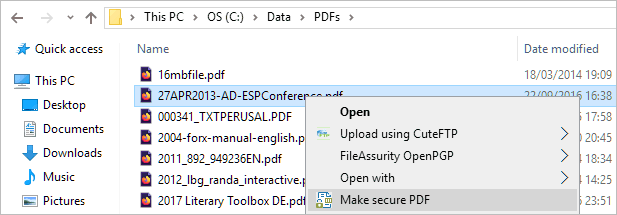

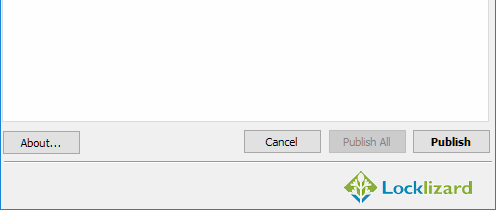
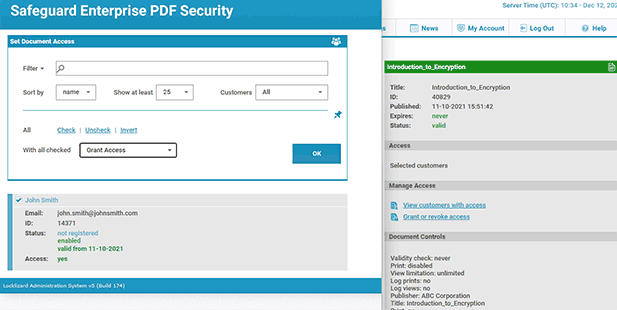
 Epub vs PDF: Which is best for ebook distribution?
Epub vs PDF: Which is best for ebook distribution? Key takeaways about ebook piracy
Key takeaways about ebook piracy FAQs
FAQs
